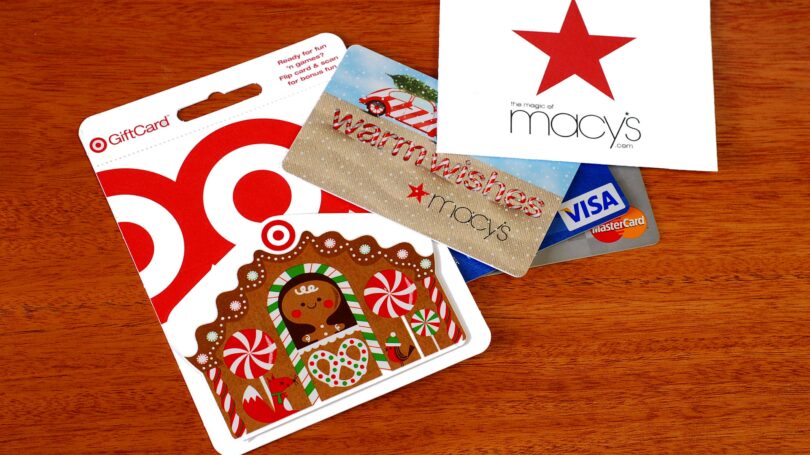Gift cards are popular for birthdays, graduations, and all other gift-giving occasions. They present a handy way to personalize an individual gift while still allowing the recipient to pick out what they like.
In this article, we’ll go over the different types of gift cards, why retailers offer them to customers, and how you can get the most for your money when buying them or using them for yourself.
Gift Card Basics
First, make sure you understand the two different types of gift cards:
Cash Cards
Cash cards can be used anywhere, and they’re sponsored by companies like Visa, MasterCard, Discover, and American Express.
- Pros: These cards offer the greatest flexibility since you can use them basically anywhere credit cards are accepted. It’s practically the same as carrying cash. You can even use them to pay bills online. They save recipients the hassle of exchanging that too-small sweater for the right size or returning a book they already own.
- Cons: As a gift, these gift cards are the least personal option available. It’s essentially a substitute for giving cash, so while your recipient will still appreciate it, it’s not a great gift for a close friend.
Store Cards

Store cards are specific to a particular retailer, such as Macy’s, Banana Republic, and Victoria’s Secret.
- Pros: These cards give you a chance to get more personal with your gift. For birthdays, graduation, or a “just because” present, a store card is a better way to show you care and know the recipient’s interests.
- Cons: It’s great that so many stores offer gift cards, but they all have their own policies for them. Especially at local shops, you need to be very careful about expiration dates. For example, some cards or certificates are only valid for 30 to 90 days. Often, you’ll find a demurrage policy in the fine print, which means the card loses a little bit of value every month. While you might give a friend a $50 card, they might be surprised to learn that, after losing $2.50 per month, their four-month-old card is only worth $40.
Who Loves ‘Em?
Sellers
Stores love gift cards. From the largest chains to the smallest mom-and-pop shops, you’ll find gift cards at almost any retail store. The reasons are simple:
- Selling a card means upfront revenue for the store, whether or not anyone redeems the card. People lose cards, forget about them, or just decide not to use the last few dollars. That’s music to a retailer’s ears. Stores immediately get the cash, and they can only come out ahead. You’ll either use the full value, leave the cash on the table, or buy even more products with your own money.
- It often leads to more business. When someone redeems a gift card, chances are they’ll go over the initial value of the card. They’ll often spend a little bit more, and they may even end up coming back as a repeat customer.
Banks and Credit Cards
Credit card companies have been getting in on the act for a while. They encourage stores to have more robust gift card programs by helping with logistics and promotion. These institutions win in the end since they get a cut of merchant fees when shoppers redeem the cards.
Consumers
Retailers and banks often reap extra revenue from gift cards, but consumers don’t always get the raw end of the deal. If you don’t want to be the loser in the equation, empower yourself. Don’t lose out on the full value of cards you give or receive. Instead, follow these tips to be a gift card winner.
How to Win the Gift Card Game
It’s up to you to be a smart gift giver and gift card user. Consider these three factors when choosing and redeeming gift cards:
1. Flexibility
Cash cards are convenient because the recipient can use them anywhere major credit cards are accepted. On the other hand, store gift cards can only be redeemed at the specific retailer. Moreover, most retailers won’t allow you to exchange store cards for cash.
2. Cost
Store cards usually don’t have additional charges and are good for their full face value. However, cash cards, such as Visa, charge a fee when issuing the card. A $50 face-value card incurs an additional charge of $1 to $5 for the buyer.
Cash cards also start charging a maintenance fee after 12 months, and this fee ranges anywhere from $2.50 to $5 per month. That can drain the card’s value pretty fast. Make sure gift cards are used within the first 12 months after they’re received, or they could end up worthless.
3. Expiration
Store cards are better in this area as well. Most retailer gift cards have no expiration date. However, if the store goes out of business, you will be unable to use or redeem the card.
On the other hand, cash cards usually have an expiration date of five years from the date of issue. That seems like a long time, but if you forget about the card or it falls behind a dresser, its value can quickly disappear due to either expiration or maintenance fees.
Choosing the Right Gift Card

Do your friends and family members a favor and consider if they’ll actually use the gift card you want to give them. Sure, they may love the idea of getting a massage or a new pair of shoes, but is it what they truly want or need? Take some time to consider their interests and hobbies before choosing a gift card.
For example, do they like to go out to dinner? If so, a card to their favorite restaurant would be appropriate. If they’re really picky or seem to have everything, just go with a standard cash card accompanied by a thoughtful note. They’ll appreciate the flexibility to choose what they buy with it.
What to Do With Unwanted Gift Cards
For many of us, we’ve been through the experience of getting an unwanted gift card but not being quite sure what to do with it or how to get some value out of it. Keep in mind that cash cards generally have the most resale value because of their flexibility. Here are some good ideas to get you started.
- Auction It. There’s a healthy market for gift cards online. eBay is a popular place to sell gift cards, as are specialty sites like Raise.com. These sites will purchase your gift card at a very high percentage of its value.
- Trade It. Most sites that allow you to sell gift cards also give you the option to trade them for items you’re interested in from other sellers. Also check out various bartering websites for more options.
- Regift It. Depending on your feelings, this is either a great way to spread the love or a terrible social taboo. If you choose to regift, do so tactfully and only with an unused card that retains its full value.
- Donate It to Charity. Contact your favorite charity and ask if they will accept your gift card. If they do, you can write off its value on your taxes as a charitable donation.
Final Word
Gift cards can make the gift-giving process much easier, especially for people that are hard to shop for. With that said, it’s important to put some thought into your choice of card so it won’t go unused and your money won’t be wasted.
If you’ve received a gift card, either use it immediately so you won’t forget about it, or visit some of the sites above where you can trade it for other cards or goods you’re most interested in.
Perhaps most importantly, look at any card you’ve received to find out if it has an expiration date and if any maintenance charges apply. And if you’re giving a card as a gift, let the recipient know if they have a time limit in which to use it.
What is your experience with gift cards? How do you feel about giving them and receiving them? Do you have any experience with trading or selling them online?